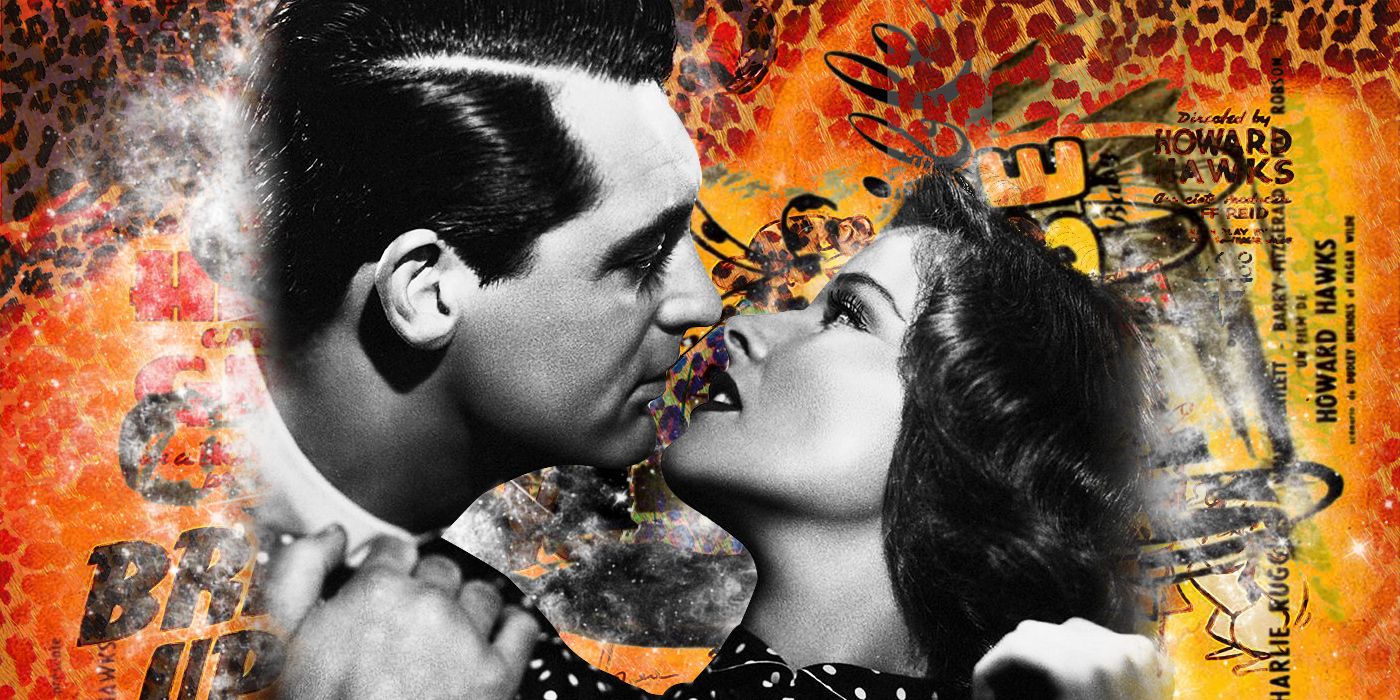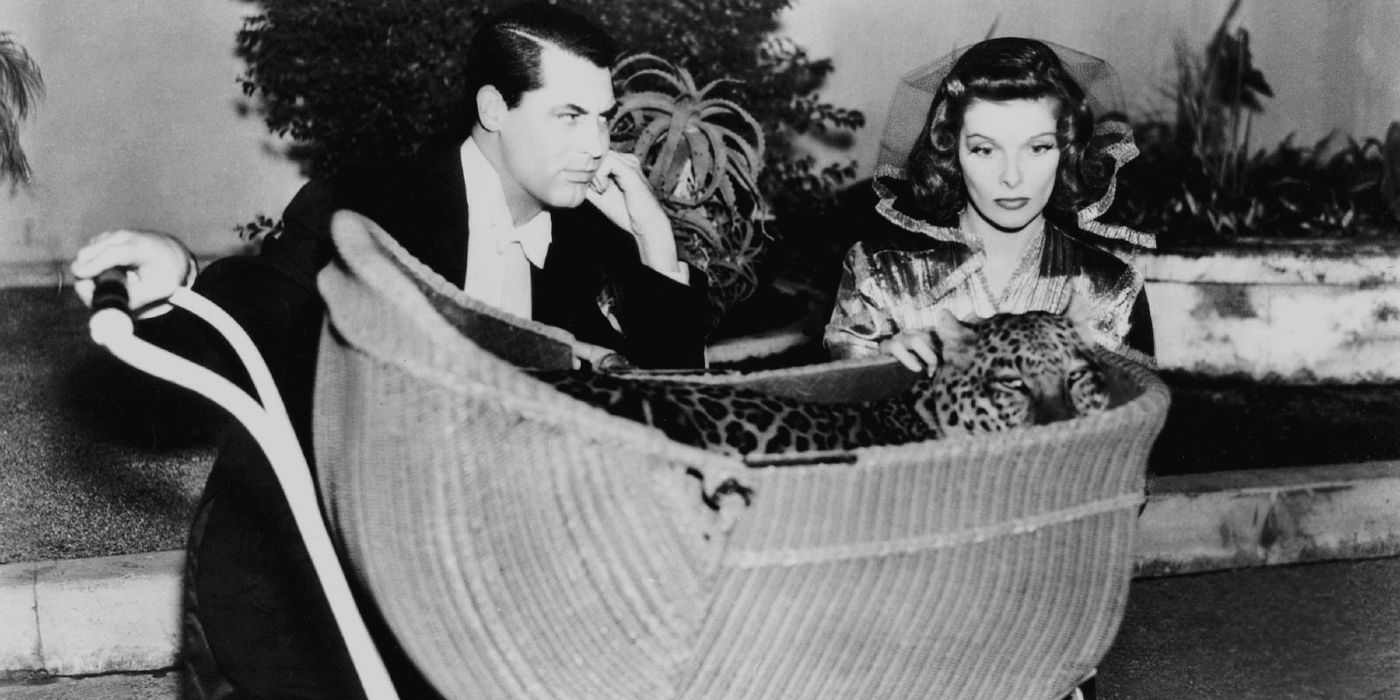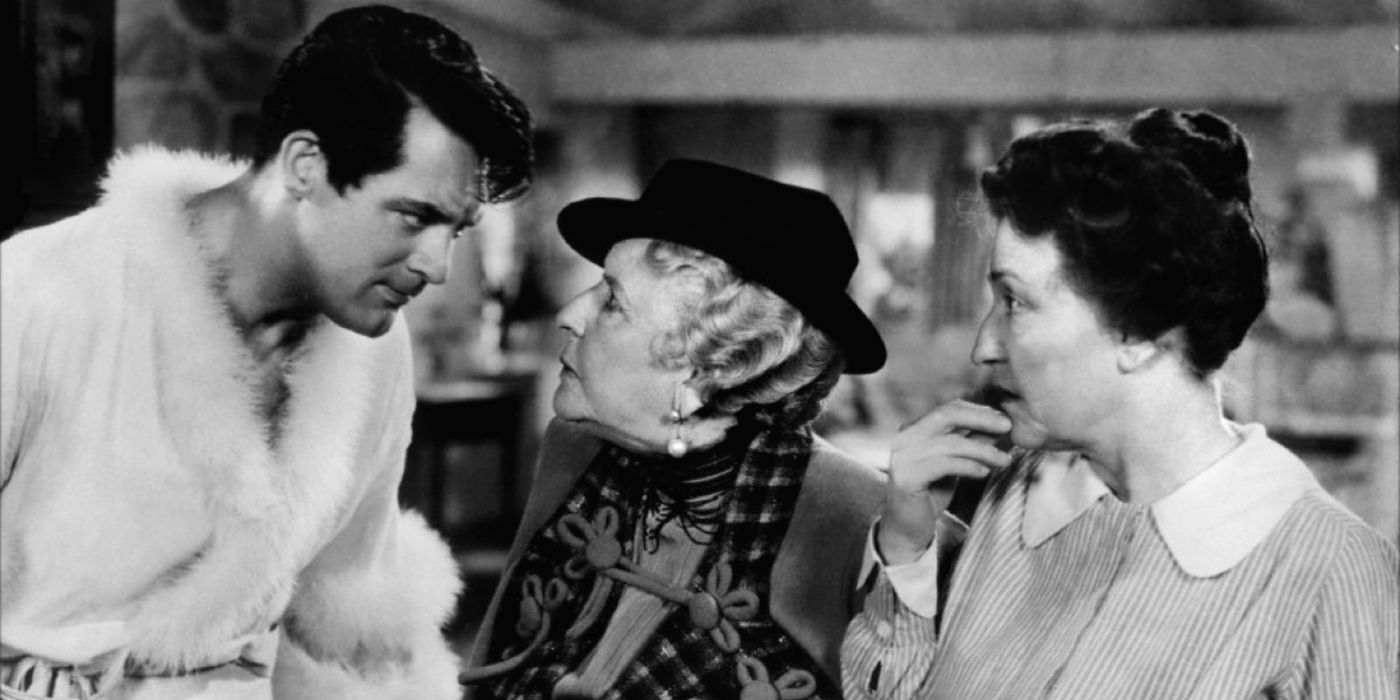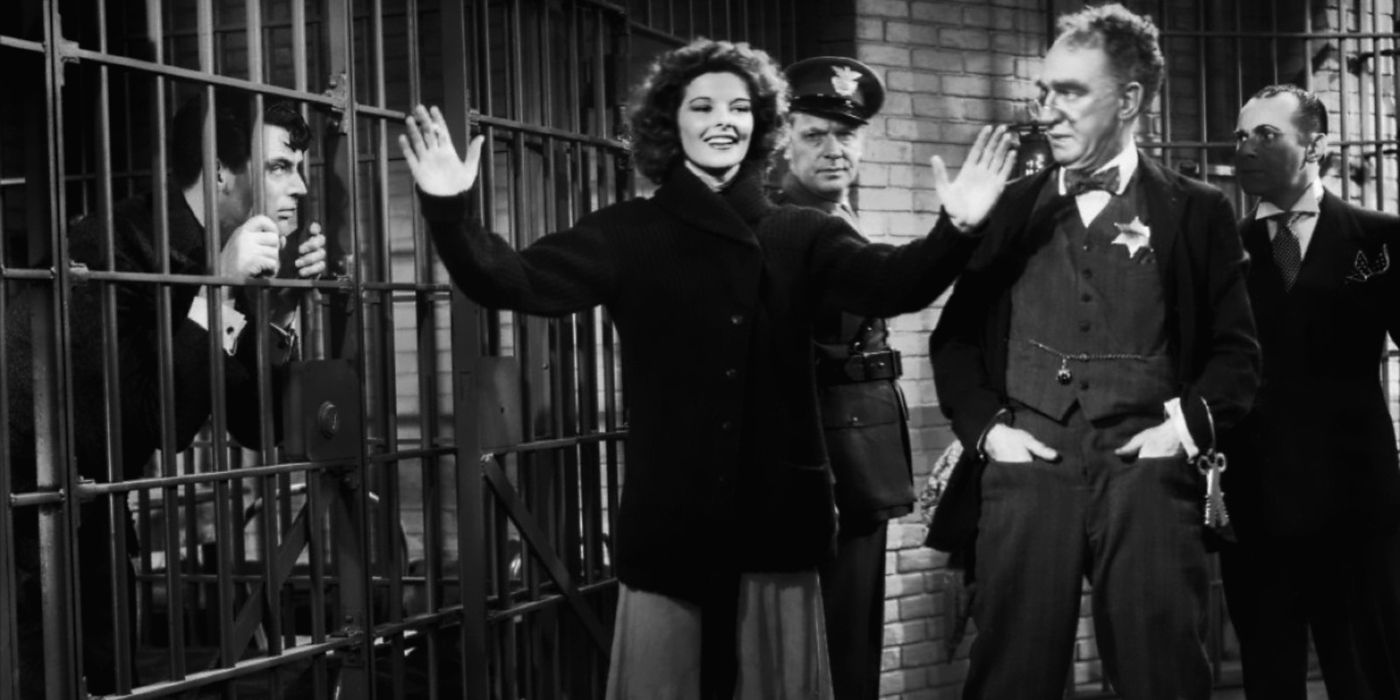Howard Hawks’ classic comedy Bringing Up Baby, about a flustered paleontologist and a moony heiress trying to care for a tame leopard, is being added to the Criterion Collection this week, and I would buy every single one of you a copy if I but had the means. The second of four collaborations between stars Katherine Hepburn and Cary Grant, the film is like a crash course in comedy history. Considered a classic screwball comedy, a subgenre that began as a spoof of romantic comedies, Bringing Up Baby contains elements of just about every subgenre of film comedy imaginable, including slapstick, masquerade, farce, absurdism, and situational comedy, the bedrock of modern network television. Watching Bringing Up Baby both paints a picture of the state of comedy at the time and acts as an invaluable reference point that allows us to see how comedy has evolved since its release. It’s also a delightfully silly romp that’s still every bit as funny as it was 80 years ago.
First, the plot – paleontologist Dr. David Huxley (Grant) has almost finished assembling a brontosaurus skeleton after 4 years of work and is waiting on the delivery of one final bone to complete the display. He needs to schmooze with a high-society lawyer (George Irving) who represents the fabulously wealthy Mrs. Random (May Robson) in order to secure a $1 million donation that his museum desperately needs. But he is waylaid by Mrs. Random’s scatterbrained niece Susan Vance (Hepburn), who proceeds to steal David’s car and ruin his fancy dinner meeting through a sequence of increasingly madcap misunderstandings. Susan, mistakenly thinking David is a zoologist, calls him the next day to get his help wrangling a tame leopard named Baby that her brother sent from Brazil as a gift. Their misadventures continue to spiral further and further out of control through a series of farcical situations that culminate in the entire cast very nearly going to prison. Susan’s flightiness finally comes in handy and she saves the day with a well-timed scheme, only to accidentally demolish David’s brontosaurus skeleton in the final scene. It’s a charming, hilarious comedy carried by an entertaining cast of characters and two of the most charismatic stars in cinema history.
In addition to being a strong representative of comedies of its era, Bringing Up Baby contains several hallmarks of modern screwball comedies: adult main characters who behave like children, a wacky cast of supporting characters, an irritating animal sidekick, a gentle exotic animal who must be delivered from point A to point B, an attempt to infiltrate high society that reveals the upper class to be every bit as dumb as anyone else, and a small lie that quickly becomes unwieldy and must still be maintained. Even the basic idea of a well-meaning imbecile making a straight-laced character’s life a living hell is a popular formula, from Planes Trains and Automobiles to its unofficial remake Due Date.
Susan and David are such modern comedic characters they could be played by Rose Byrne and Seth Rogen. Susan is a force of nature, speaking constantly and moving from subject to subject as rapidly as the words fly out of her mouth. Her optimism is so infallible that she refuses to hear any dissent or criticism from David. She’s so accustomed to avoiding unpleasantness that she turns David’s words around almost reflexively, resulting in a steady stream of clever wordplay that’s almost exhausting to keep up with. A big chunk of the film’s laughs come from watching David, who is a child himself but a more ordered one, try to argue with her wild misinterpretation of events, gradually becoming more and more resigned to her whirlwind presence until he just stops resisting her. It’s a similar dynamic to the one shared by Steve Martin and John Candy in Planes Trains and Automobiles, or, more recently and of arguably less distinction, David Spade and Lauren Lapkus in The Wrong Missy. He’s the “straight man” to her buffoon, a guy who finally learns how to loosen up a bit thanks to this wackily vivacious spitfire that just wandered into his life, and it’s a dynamic that’s still utilized in most comedies to this day.
The carousel of zany side characters in Bringing Up Baby is akin to a Happy Madison production. Steve Buscemi and Shaq could’ve popped up in here and I would’ve barely batted an eye. Between a vapid European psychotherapist (Fritz Feld), an aloof old widow (Robson), a confrontationally alcoholic gardener (Barry Fitzgerald), and the dumbest police constable who has ever lived (Walter Catlett), there’s plenty of room for Kevin James to show up in a mullet wig and start doing bits about crossfit. Like most Happy Madison films, Bringing Up Baby isn’t a true ensemble, but rather populates its supporting cast with comedic archetypes to provide Susan with an endless supply of entertaining targets for her irreverence.
There’s also the presence of two distinctly different types of animal sidekick, a comedic device that would become unreasonably popular in the decades to come. The titular Baby is a loveable tame leopard who acts as an obstacle for the characters that is absurd on its face. Additionally, Baby’s presence directly fuels many of the film’s comedic scenes, as the mere idea of a leopard in Connecticut can create endless amounts of physical gags and farcical dialogue. (Think Bill Murray driving cross-country with an elephant in Larger Than Life, or Jim Carrey working to recover a stolen dolphin in Ace Ventura: Pet Detective.) Meanwhile, there's George, a thoroughly irritating terrier whose habit of barking incessantly and burying important items gives David a frustrating nemesis even less concerned with reason than Susan. Like Ben Stiller’s relationship with Puffy the dog in There’s Something About Mary, he has to swallow his anger and acquiesce to the dog’s whims in order to get what he wants.
However, a key difference between Bringing Up Baby and modern comedies is that David isn’t a mean-spirited cynic or a viciously sarcastic killjoy. Many modern comedies involve a protagonist who enjoys being cruel – Dumb & Dumber, Dinner for Schmucks, Anchorman, Planes Trains and Automobiles, Step Brothers, Talladega Nights, the Ace Ventura films, and countless others either feature dopey man-children who are gleefully malicious, or put-upon “straight men” who wield a perceived superiority to humiliate the other characters. (Sometimes both!) David is also a man-child, but that quality manifests as an interest in “frivolous” things like dinosaur bones and an inability to make firm decisions or stand up for himself. We get some brief flashes of David’s frustration such as when he mimes strangling Susan in one scene, but those flashes are treated as quick gags that Susan doesn’t even notice. He never tries to bully her back to reality, nor do we get the sense that such behavior is even an option for him; that’s a distinctly modern trend.
For all its modern sensibilities, Bringing Up Baby is still a bit dated. I suppose we can forgive it for that, considering the movie was filmed in 1937. For instance, it’s heavily reliant on farce, which was more or less the standard form of comedy at that time. Think of the wordplay and absurdism of something like the Marx Brothers. Bringing Up Baby is less absurd, as it still purports to take place in the real world albeit in an extremely heightened reality, whereas the Marx Brothers tend to wreak their unique brand of havoc in alternate universes wherein nobody notices that they are anarchic fools. But the rapid-fire repartee between Susan and David was a common hallmark of comedies at the time that has drastically faded from prominence in recent decades, which makes it an oddly refreshing film to revisit despite its age. Some gags are always going to be funny, and thanks to its clever writing, joyfully silly performances, and willingness to embrace a number of seemingly disparate ideas, Bringing Up Baby inadvertently created a road map for the next century of comedic filmmakers to follow.




